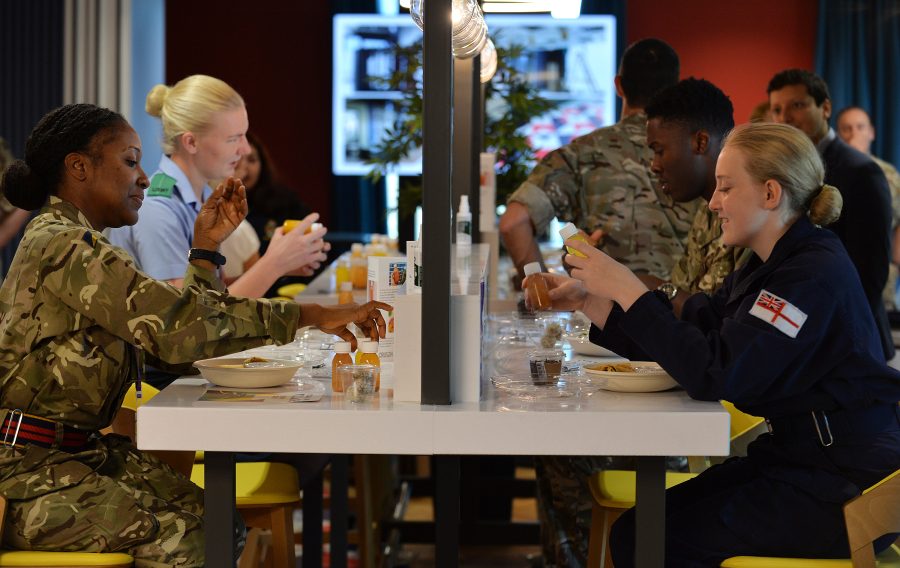
As a nation, we have always celebrated our Armed Forces, and rarely more so than during Armed Forces Week. It’s an opportunity for us to express our gratitude to those who serve and have served to keep us safe, says Mark Baker, Chief Operating Officer, Sodexo Defence and former senior RAF officer.
But, with than more 7,000 people leaving than joining last year, our Armed Forces face an existential recruitment and retention crisis. There is no question that the lived experience of our service personnel on the sites they call home, plays a significant part in people’s decision on whether they want to join, or will continue to serve.
Having been a partner to the Ministry of Defence for over 30 years, Sodexo understands the challenges of delivering a lived experience which lives up to the expectations of the modern soldier, sailor or airman. That’s why we convened a roundtable with 21 leaders from across the military community, (including Brigadier James Cook, Army Lead for the future lived experience) the Civil Service, the charitable sector, (including Cobseo chairman Sir Nick Pope), Academia, and beyond, to explore the challenges of the lived experience, and how we can address them.
At our roundtable, we identified three key themes through which we could discuss those challenges: barriers between the Armed Forces and wider society, the changing expectations of personnel, and partnerships with other organisations.
Breaking down barriers between the Armed Forces and society
The Armed Forces need to better convey their purpose, their values, and why a career in the military should be viewed as being worthwhile. It is only through closing the gap between the military and the society it protects, that we will improve recruitment and retention.
Whilst public perception of the military is broadly positive, and research from YouGov shows that 58% of people have a favourable view of the Armed Forces, the natural relationship between the British people and the Armed Forces, has changed. In the past, many people would have known someone who has either served or is serving in their family or community. Nowadays, a shrinking force with bases closed off from their communities means that it is no longer the case.
Breaking down this gap will be vital to solving the recruitment and retention challenges. From better explaining to young people the purpose and values of the military, as recruitment focuses on a generation that expects its employer to share its own values, to ensuring that those with families, women, and other minority groups within the Armed Forces feel that the lived experience is a positive one. The more we can break down barriers, the more we can ensure that life in the Armed Forces is an appealing one.
Meeting the changed expectations of Armed Forces personnel
To recruit and retain the fighting force of 2030 and beyond, the Armed Forces must adapt the lived experience to meet the expectations of a new generation and ensure that service life remains a compelling prospect. However, satisfaction with service life in general has fallen for the second year running, dropping to 42%.
As so much of a service person’s life is within a military base, facilities play a crucial role in providing the setting for those expectations to be met. They provide the foundation to ensure service personnel are physically fit and, crucially, that morale is high; essential components of a fighting force.
We cannot expect service personnel, civil servants and their families to operate without access to a decent standard of basic provision, from Wi-Fi to food, and exercise facilities that are run in a way which is convenient for them. We can no longer expect families to uproot their lives every time one member of the family is moved to a new posting. We must ensure that we are providing both the physical and mental health support that our people need to be effective both during peacetime and conflict.
Improving the lived experience through external partnerships
The Armed Forces will not be able to provide a modern, adaptable lived experience, based on good facilities alone. Instead, it will need to develop an ecosystem of support, including local communities and other external organisations. Whilst some of the expertise third-party organisations can provide on-base and in surrounding communities may be considered desirable to have, some support is absolutely critical.
For example, in the context of the wider family, we discussed the importance of, and limitations around, provision of Special Education Needs and Disabilities (SEND) support. This support is a lifeline to military families with children who have special educational needs, but frequent moves, and changing provisions around the country, make ensuring continuity difficult.
Whilst the military isn’t responsible for delivering many services which can improve the lived experience, an openness to identifying where they can work with external organisations to help service personnel access them is vital, including making it easier for these organisations to access bases to deliver services.
First steps
This is a conversation that is only just beginning. Sodexo will continue to bring together key players, to understand the challenges and identify solutions. But what’s already clear is that, without the right lived experience, we will struggle to recruit and retain a military force that is sustainable to meet the challenges of the future.
To read the white paper, please click here.
If you would like to join our community and read more articles like this then please click here








